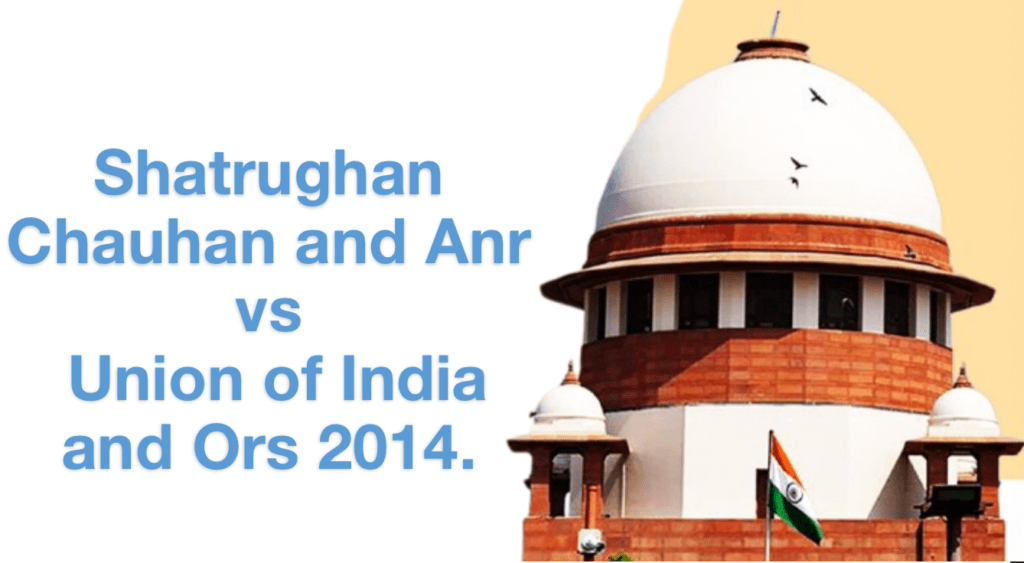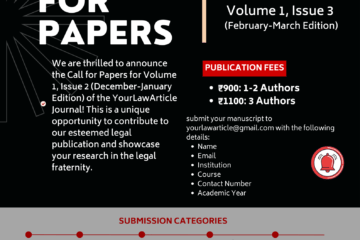
Shatrughan Chauhan and Anr vs union of India and Ors 2014.
In supreme court of India.
| NAME OF THE CASE | Shatrughan Chauhan and Anr vs Union of India, 2014 |
| EQILIANT CITATION | 3 SCC 1 |
| DATE OF JUDGEMENT | 21 Jan 2014 |
| COURT | Supreme court of India |
| CASE NO | Writ (criminal) no. 34,56,136,139,141,132,187,188,190,191,192,193,55 / 2013, |
| CASE TYPE | Writ (criminal) |
| PETITIONER | Shatrughan Chauhan |
| RSEPONDENT | Union of India and ors |
| BENCH | Justice P. Sathasivam, justice Ranjan gogoi, justice, shiva Kirti Singh. |
| STATUES | Indian constitution of India, Indian penal code |
| IMPORTANT SECTION /ARTICLES | Art.21, Art.32, Art.72, Art.161, S.30 |
FACTS
- On February 8, 2013, the President rejected the appeals for mercy. The Petitioners only learned of this until this point from reports in the media and had not received any official correspondence about it.
- Thus, there has been a complete delay of 12 years and 2 months from the time that benevolence petitioners’ petitions were documented and the time that the solicitors received notice of the President’s dismissal.
- The subsequent writ request was filed with a petition to grant a writ of presentation declaring that the President’s dismissal of the benevolence petitions was unlawful and to prevent the death penalty from being imposed on the defendants by enforcing a punishment very similar to indefinite imprisonment.
ISSUES RAISED
1.whether the right to life protected by Art. 21 would be violated as a result of the death sentence delay.
2. Whether the mere fact that an execution was delayed and would be enough to commute a death sentence.
ARGUMENTS BY PETITIONER
- The petitioners’ fundamental rights have been breached by the executive’s application of the constitutional authority granted to it under Article 72/161.
- Executive orders against the petitioners that are being challenged were made without taking into account other circumstances (delay), which are essential for making such decisions.
- The right to life under Article 21 would be violated by an excessive delay in executing a death sentence, and the convict would have the right to petition the court under Article 32 of the Constitution.
- The safeguarding of human beings should always be a top priority.
- If there is an unexpected delay in the execution of a death sentence, the Court can take the convict’s complaint into consideration in a petition made pursuant to Article 32, even without a President Order
ARGUMENTS BY RESPONDENT
- Since these details must be obtained from the State/Prison authorities and require extensive communication with both the prison authorities and State Government, it is alleged that there was a delay in providing them for the President’s consideration of the Mercy Petition.
- It would take time to carefully examine these documents and determine the advantages and disadvantages before making a decision.
- The length of time required to examine mercy petitions may vary depending on the facts surrounding the case, the extent of inquiry required, and the number of mercy petitions presented on behalf of the accused. In addition, there cannot be a set period of time for consideration of mercy requests.
- Art. 72 does not specify a due date for processing the mercy petition. and as a result, no such time limit may be established.
- The voluntary nature of Art. 72 means that it cannot be restricted, changed, altered, or interfered with by any statutory provision or authority.
- A person serving the death penalty is not required to request a commutation simply because of a delay. (International Airport Authority v. D Shetty). When someone is found guilty of an awful deed after going through the proper process, they are sentenced to death. Since this sentence is subject to appeal and review, the delay in execution cannot be used as grounds for commuting the punishment for such an awful act.
- Moreover, commuting a death sentence solely for the sake of time would not be in the victim’s interests.
RELATED PROVISION
Art.21The safeguarding of life and personal liberty No one may be deprived of their life or private liberty other than in accordance with the law.
Art.161 The governor has the authority to commute sentences, remit fines, and award other types of pardons. Any individual guilty of any offence against any law related to a matter to which the executive power of the State extends may request a pardon, reprieve, respite, or remission of penalty, or the Governor of a State may suspend, remit, or commute their sentence.
Art.32Measures for enforcing the rights given by this Part
- The right to apply to the Supreme Court in the appropriate manner to have the rights given by this Part implemented is guaranteed.
(2) The Supreme Court has the power to issue orders, directives, or writs, such as writs of habeas corpus, mandamus, prohibition, quo warranto, and certiorari, as may be necessary to enforce any of the rights granted by this Article.
(3) Parliament may by legislation authorize any other court to execute all or some of the powers exercised by the Supreme Court under section (1) or (2) without affecting the authority granted to the Supreme Court by clauses (1) and (2).
(4) Unless this was allowed by this Constitution, the right protected by this article must not be suspended.
Art.72 The President has the authority to commute or postpone some sentences and to give pardons, among other things.
(1) The President has the authority to commute sentences, postpone sentences, or give respites or remissions of penalty to those convicted of crimes.
(a) in all instances when a Court Martial renders a judgment or sentence;
(b) in all situations when the punishment or sentence is for a violation of any legislation pertaining to a subject under the Union’s executive purview
2) Nothing in subclause (a) of Subsection (1) shall impair the Governor of a State’s ability to suspend, remit, or commute a death sentence under any currently in effect statute.
Art. 161. Governor has the authority to commute, suspend, or remit sentences in certain circumstances, among other things. Every individual guilty of any offense against any law related to an issue to which the executive power of the State extends may seek a pardon, reprieve, respite, or remission of penalty, or the Governor of a State may suspend, remit, or commute their sentence,
Art.303 Punishment for murder to life in prison. Anyone who commits murder while serving a life sentence will be executed.
JUDGEMENT.
The court decided that the delay of twelve years in examining the kindness request is a significant foundation for the substitution of life in prison for the death penalty in the absence of reasonable, conceivable, and satisfactory reasons for the delay.
The Court was of the important opinion that excessive, excessive, and unreasonable delay in the execution of the death penalty gives clearly credit to the torture, which is actually a violation of Article 21, and thus qualifies as the basis for remission of the sentence. Article 21 can be correctly referred to as the “substance of fundamental rights,” which states that no one should be denied their life or individual freedom unless specifically prohibited by a legal procedure. Each civilized society must, there are no characteristics that are more important than its people’s ability to live their individual life. “Our Constitution is greatly appreciated for its explication,” according to P. Sathasivam, CJI. One such well written provision is Article 21 of the Constitution, which declares that everyone has the inherent right to live and prohibits depriving anyone of their life or their freedom of the individual in any other manner than that as authorized by law.
The 2 pillars of the right to life and the freedom of the person hold power over all other aspects of the political and social demand. As stated clearly, Article 21 of the Constitution extends beyond the stage of sentencing decision to include the execution of that punishment. Delay in carrying out a death sentence has a dehumanizing effect on those who are held accountable. The court has directed the execution of the death penalty in this case because of a delay brought on by circumstances beyond the inmates’ control. When postponing execution results in the convict’s bodily and mental desolation and causes torment, the court correctly changed the death penalty to imprisonment for life. This clearly violates Article 21.it is necessary to mention it.
The court. which, in addition to expanding the scope of Article 21 regarding the privileges of prisoners, is the sole defender of the values cherished in the Indian Constitution. It also contributed to the global norms established by the International Covenant on Civil and Political Rights, to which India is a signatory. The Court observed “craziness” as an actual situation and stated clearly that to execute a crazy person who is unable to understand the meaning of his actions and who cannot defend himself would be a clear violation of his rights even though legal system is practically on an equal basis with international law.
In fact, it is necessary to take into account how the main tenet of our nation’s criminal equity framework is to attempt to safeguard specific liberties of a person who has been condemned for an offense, with Article 21 being the most significant. Killing a person who has lost his or her mental stability goes against not just the principle of humanity but also the tradition that must be upheld logically. Due to two death convicts’ continuing mental illnesses, the court dismissed their death sentences to imprisonment for life. By doing this, the court not only complied with domestic and international legal norms, but also created a real example for other nations to follow in making sure that the sentence is carried out in accordance with the law.
Also, it should be noted that the Supreme Court in the current case served as a benchmark for comprehending our Constitution’s governmental structure by engaging in a limited amount of research work. This Court effectively establishes a system of checks and balances by viewing excessive and unreasonable delay as a crucial moderating factor that drives the death penalty into life imprisonment, so demonstrating that the Executive will also be held accountable for their actions.
Excellent standards were set in the Shatrughan Chauhan case to protect death row prisoners’ rights to life and individual liberty, which are protected by Article 21 of the Constitution. These regulations have reduced the deviations in the execution of the existing legislation for interest protection generally of the convicts.
CONCLUSION
Notwithstanding the fact that the defendants’ decision to accept the death penalty was a wise one given the long 12-year delay they had to endure, this ruling may create a dangerous precedent for similar instances in the future. Only delaying the change of the sentence will create a complicated legal situation.
The evidence clearly supports the idea that the President and Governor’s optional force under Art. 72/161 cannot be regulated by any other legal effect or authority. Yet, if the equivalent is not under control, problems might arise. Hence, by making the force obvious, we may make it hard to estimate these forces. The Ministry may be positively required by the Court to adhere to its own principles, which may result. The delay brought about a tremendous growth.
This will enable to make sure that the prisoners on death row enjoy all of their rights up until the very last second of their execution.
Written by A. Darrin, student of St. joseph`s college of law bangalore




0 Comments